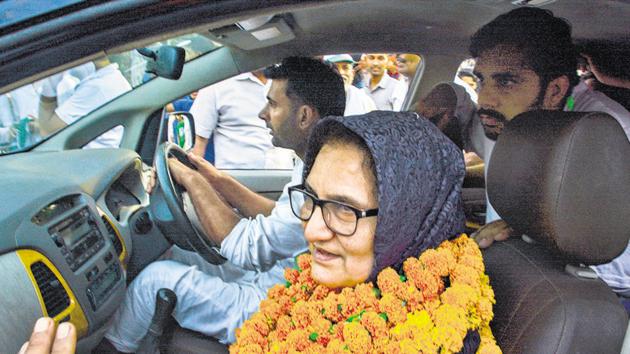Opposition’s victory in Kairana defeats apartheid against Muslims in Uttar Pradesh | Opinion
It’s hard to miss the socio-political import of RLD candidate Tabassum Hasan’s victory against the BJP’s Mriganka Singh in Kairana. Together with the Noorpur assembly seat the Samajwadi Party wrested from the BJP, the Opposition’s gain is way bigger than the legislative presence it secured at the expense of the ruling dispensation
The 16th Lok Sabha finally has a Muslim representative from the country’s most populous state. For the first time since Independence, not a single representative from the minority community — which is also the country’s second largest majority — was elected from Uttar Pradesh in the 2014 polls. The Bharatiya Janata Party (BJP) offered no Muslim candidate. Those who contested from other parties did not win.

It was apartheid through ballot against a social group accounting for 19% of the state’s population of 200 million. It’s hard, therefore, to miss the socio-political import of Rashtriya Lok Dal (RLD) candidate Tabassum Hasan’s victory against the BJP’s Mriganka Singh in Kairana.
Together with the Noorpur assembly seat the Samajwadi Party (SP) wrested from the BJP, the Opposition’s gain is way bigger than the legislative presence it secured at the expense of the ruling dispensation. The tide could turn against the saffron party in the 2019 polls if the social alliance that shaped up in the seats the RLD and the SP have won gains wider traction. The stakeholders have good reasons now to consolidate the four way, inter-party rapprochement including the BSP and the Congress.
Alliances at party-level cannot succeed without popular support that determines their longevity. Cases in point of failed top-tier pacts without sustainable social foundations include Kanshi Ram’s short-lived partnership with Mulayam Singh (1993) and Mayawati’s with the BJP (1995). Ditto for the alliance between Mamata Banerjee’s Trinamool Congress and the Congress in West Bengal.
Subject to clause force majeure, they have now a semblance of a social plinth on which they can raise the envisioned edifice of an anti-BJP front in UP. The inter-caste, inter-communal fusion is tenuous by some accounts. A joint effort at incrementally strengthening the social bonds between Dalits, Muslims and Jats should start right away. For the process isn’t going to be easy.
The wounds of the 2013 Jat-Muslim violence that helped the BJP polarise UP haven’t fully healed. They rankle still. But in the role of a peacemaker, Jayant Chaudhary, the RLD’s young face who has striking resemblance with his grandfather Charan Singh, can make a difference.
The former Prime Minister had a pronounced pro-rural bias. That made him, after Indira Gandhi, the second most important leader in the Indo-Gangetic plains. His social base of Muslims, Jats and backwards rested on the commonality of their economic interests. In influence and reach, it extended from Haryana to Bihar across UP. Jat strongman Devi Lal, Yadav chieftain Mulayam Singh and Bihar’s OBC icon Karpoori Thakur were students out of Charan Singh’s political school. They ran academies of their own in their states later.
The path ahead for the combined Opposition is in aggregating — in the manner in which it was done in Kairana and Noorpur — what the BJP successfully segregated in 2014. To negotiate that social road will be difficult, almost undoable in circumstances the saffron parivar is adept at simulating.
Take for instance the “Ganna ya Jinnah” chant geared at Hindu-Muslim polarisation. It did not work in Kairana as bread and butter issues unaddressed by BJP regimes in Delhi and Lucknow triggered an antidotal class affinity. The result: the socially conflicting or competing identities found a common adversary.
Mobilised separately, they headed in the same direction. In the process, the Muslims, second only to Dalits in terms of numbers, regained the electoral relevance they had lost in the apartheid game the BJP orchestrated through binaries aimed at beguiling the omnibus Hindu.
Its deleterious impact on Muslim representation had a pan-Indian ring to it. Consider this: at 23, the community’s representation in the current Lok Sabha is the lowest since 1962. Until Kairana, no Muslim found a parliamentary berth from even Rajasthan, Gujarat and Madhya Pradesh. The BJP had swept these states as it did in UP.
Of the 17.16 crore votes it polled in the last general elections, the percentage point gap between the BJP’s Hindu and Muslim votes went up to 28 compared to 18 in 2009. In Bihar, the party’s only sitting MP in the 15th House, Shahnawaz Hussain, lost from Bhagalpur largely on account of internal sabotage. The party peer who reportedly did him in with his polarising propaganda is now a minister at the Centre.
Minus the Kashmir-centric People’s Democratic Party of Mahbooba Mufti, the sole Muslim NDA MP in the House is the Loktantrik Janata Party’s Mahboob Ali Kausar, who won from Khagaria in Bihar. “The democratically untenable situation had to be reversed,” noted an RLD leader. For him, the happiest augury was that his party opened its account in the 16th House by sending a Muslim woman.
Shades of 1991 when Kanshi Ram entered the Lok Sabha with Mulayam’s help in the Etawah by-poll after the BJP’s assembly victory on the Mandir wave? Hope not. For the “Miley Mulayam, Kanshi Ram, Hawa Mein Ud Gaye Jai Shree Ram” slogan didn’t last despite its proven utility. The Maya-Mulayam confrontation exacerbated by the State Guest House episode, in which the SP supporters attacked the BSP leader, ended it all. She crossed over to the BJP for another quick-fire political marriage and divorce.
Is Kairana another political short story? Or will it be an epoch-making opener? Much will depend on how accommodating competing parties can be.
Twitter: @VinodSharmaView



